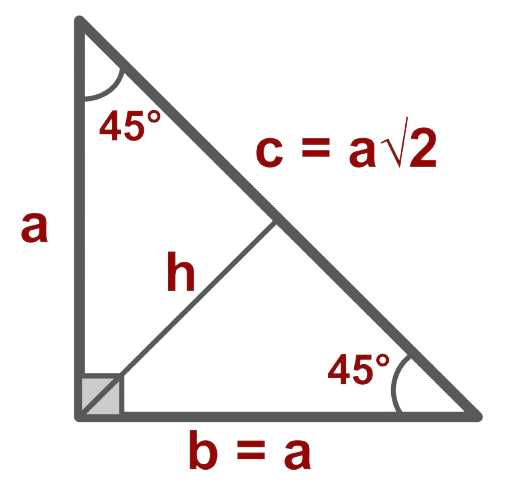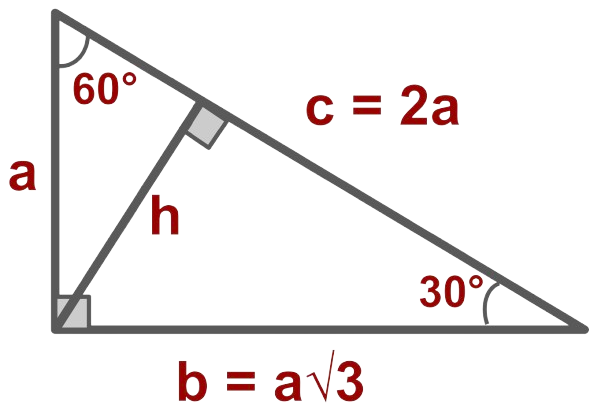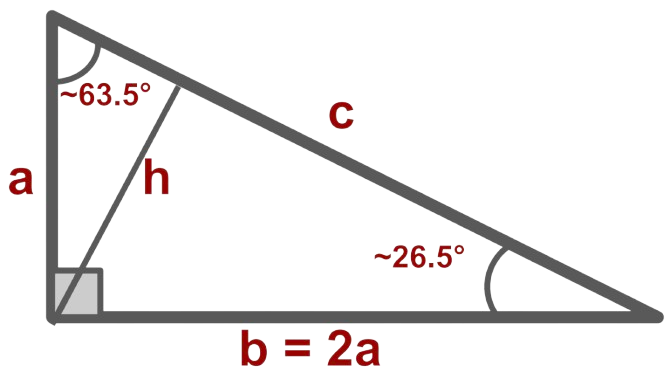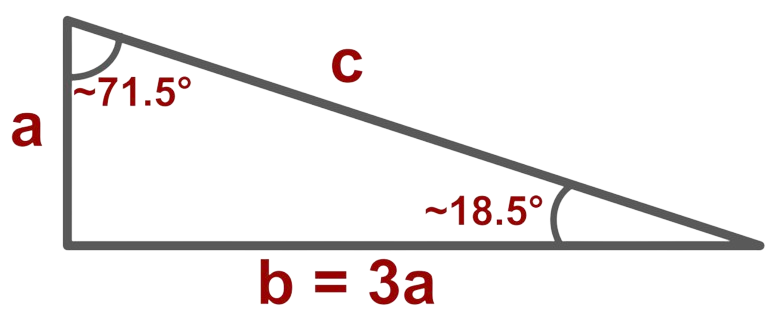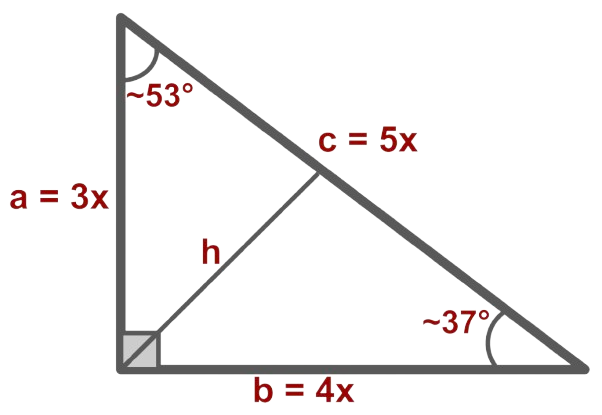Special Right Triangles Calculator
The Special Right Triangles Calculator is a free, user-friendly, and advanced online tool that helps you find missing values among the Perpendicular (a), Base (b), Hypotenuse (c), Perimeter, Area, and Altitude to the Hypotenuse for five different types of right triangles. Simply enter one known value, and the calculator will instantly compute all key dimensions with accuracy and speed.
This calculator specifically supports the following five triangle types, each of which follows predictable geometric patterns:
- 45°-45°-90° Triangle (Isosceles Right Triangle)
- 30°-60°-90° Triangle
- Triangle with b = 2a (where base is twice the perpendicular)
- Triangle with b = 3a (where base is three times the perpendicular)
- 3x-4x-5x Triangle (a classic Pythagorean triplet)
The calculator also provides clear, step-by-step calculations steps and geometric breakdowns—helping you learn, verify your answers, or use it as a quick reference tool for assignments or real-world applications. Always accessible, accurate, and educational—only on CalculationClub.com.
How to Use the Special Right Triangles Calculator
Special Right Triangles Calculator is simple and intuitive. Just follow these steps:
1. Select the Type of Special Triangle
Begin by choosing one of the five predefined triangle types from the dropdown menu:
- 45°-45°-90° Triangle
- 30°-60°-90° Triangle
- Right Triangle with b = 2a
- Right Triangle with b = 3a
- 3x-4x-5x Right Triangle
2. Enter Any One Known Value
Provide a value for any one of the following parameters:
- Perpendicular (a)
- Base (b)
- Hypotenuse (c)
- Perimeter
- Area
- Altitude to the Hypotenuse
3. Choose Decimal Precision
Select how many decimal places you’d like your results to display for greater control over accuracy.
4. Select Your Preferred Unit of Measurement
Choose from a list of supported units:
- Meters (m)
- Centimeters (cm)
- Millimeters (mm)
- Yards (yd)
- Feet (ft)
- Inches (in)
Once you’ve entered the value and selected the settings, the calculator will automatically compute and display all remaining triangle properties based on the specific geometric relationships of the selected triangle type.

Special Right Triangles Calculator
What is a Right Triangles?
A right triangle is a type of triangle that has one angle measuring exactly 90 degrees, also known as a right angle. A right triangle has the following key characteristics:
- One right angle (90°)
- Two other acute angles (each less than 90°), which always add up to 90°
- Three sides:
- The Hypotenuse (c) — the longest side, opposite the right angle
- The Perpendicular (a) and Base (b) — the two shorter sides that form the right angle
Pythagorean Theorem
In any right triangle, the relationship between the three sides follows the Pythagorean Theorem:
Hypotenuse² = Base² + Perpendicular²
a2 + b2 = c2
Right triangles are the foundation for many concepts in geometry and trigonometry and serve as the basis for special right triangles, which have consistent side ratios that simplify calculations.
These special right triangles are based on fixed angle patterns or predictable side relationships. Below, we explore five common types that can be quickly solved using known geometric formulas when just one value is provided:
This formula allows you to calculate the length of any one side if the other two are known.
1. 45°-45°-90° Triangle
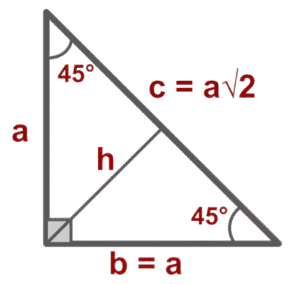
In a 45°-45°-90° right triangle, two of the angles are equal, each measuring 45°. Since these two angles are equal, the sides opposite to them must also be equal. This means the base and the perpendicular sides are the same length, which we call 𝑎.
To find the length of the hypotenuse c, we use the Pythagorean theorem:
c2 = a2 + b2= a2 + a2= 2a2
c = a√2
- Angle Pattern: 45°, 45°, 90°
- Side Ratio: a : a : a√2
- a = leg (Perpendicular and Base are equal)
- c = Hypotenuse = a√2
- Perpendicular (a) = Base (b)
- Hypotenuse (c) = a√2 = b√2
- Perimeter (P) = a + b + c = a + a + a√2 = a(2 + √2) = b(2 + √2) = c(1 + √2)
- Area (A) = $\frac{1}{2}$ × a × b = $\frac{1}{2}$ × a × a = $\frac{a²}{2}$ = $\frac{b²}{2}$ = $\frac{c²}{4}$
- Altitude to Hypotenuse (h) = (a × b) / c = (a²) / (a√2) = $\frac{a}{√2 }$ = $\frac{b}{√2 }$ = $\frac{c}{2}$
This triangle’s consistent angle and side ratios allow for quick and precise calculations once any one side is known.
| Triangle Type | 45° – 45° – 90° |
|---|---|
| Shorter Leg (a) | $x$ |
| Longer Leg (b) | $x$ |
| Hypotenuse (c) | $x\sqrt{2}$ |
| Angle α | 45° |
| Angle β | 45° |
| Area | $\frac{x \cdot x}{2} = \frac{x^{2}}{2}$ |
| Perimeter | $x + x + x\sqrt{2} = x(2 + \sqrt{2})$ |
| Height (h) | $h = \frac{ab}{c} = \frac{x \cdot x}{x\sqrt{2}} = \frac{x}{\sqrt{2}}$ |
2. 30°-60°-90° Triangle
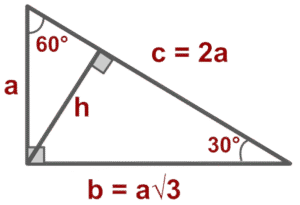
In a $30^\circ$, $60^\circ$, $90^\circ$ triangle, let:
– Perpendicular (opposite $30^\circ$) = $a$
– Hypotenuse = $c$
– Base (adjacent to $30^\circ$) = $b$
Using the sine function:
$\sin(30^\circ) = \frac{\text{Opposite}}{\text{Hypotenuse}} = \frac{a}{c}$
We know that:
$\sin(30^\circ) = \frac{1}{2}$
So:
$\frac{a}{c} = \frac{1}{2}$
$ \Rightarrow $ c =2a
This shows that in a $30^\circ$-$60^\circ$-$90^\circ$ triangle, the hypotenuse is twice the length of the side opposite the $30^\circ$ angle.
Now using the Pythagorean theorem to find base $b$:
$c^2 = a^2 + b^2$
Substitute $c = 2a$:
$(2a)^2 = a^2 + b^2 \Rightarrow 4a^2 = a^2 + b^2$
$\Rightarrow b^2 = 3a^2$
$ \Rightarrow$ b = a√3
- Angle Pattern: 30°, 60°, 90°
- Side Ratio: a : a√3 : 2a
- a = shorter leg (opposite 30°)
- b = a√3 (longer leg)
- c = 2a (hypotenuse)
- Perimeter = a + a√3 + 2a = a(3 + √3)
- Area = (1/2) × a × a√3 = (a²√3) / 2
- Altitude to Hypotenuse (c) = (a × a√3) / (2a) = a√3 / 2
This triangle is frequently encountered in geometry and trigonometry due to its well-known proportions.
| Triangle Type | 30° – 60° – 90° |
|---|---|
| Shorter Leg (a) | $x$ |
| Longer Leg (b) | $x\sqrt{3}$ |
| Hypotenuse (c) | $2x$ |
| Angle α | 30° |
| Angle β | 60° |
| Area | $\frac{x \cdot x \sqrt{3}}{2}$ = $\frac{x^{2} \sqrt{3}}{2}$ |
| Perimeter | $x + x \sqrt{3} + 2x$$ = x(3 + \sqrt{3})$ |
| Height ($h$) | $h = \frac{ab}{c}$$ = \frac{x \cdot x \sqrt{3}}{2x}$ = $\frac{x \sqrt{3}}{2}$ |
3. Right Triangle with b = 2a
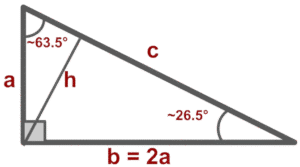
This right triangle features a base twice the length of the perpendicular, producing a fixed ratio of sides. It follows the Pythagorean relationship precisely and is useful in various geometric contexts.
Use Pythagorean theorem to find base $c$:
$c^2 = a^2 + b^2$
Substitute $a = 2a$:
$c^2 = a^2 + (2a)^2$
$c^2 = a^2 + 4a^2$
$c^2 = 5a^2$
c = a√5
Find angle
$\sin A = \frac{a}{c}$ = $\frac{a}{a\sqrt{5}}$ = $\frac{1}{\sqrt{5}}$ = $\frac{\sqrt{5}}{5}$
∠A $= \sin^{-1}\left(\frac{\sqrt{5}}{5}\right) \approx 26.57^\circ$
∠B $= 90^\circ – A \approx 63.43^\circ$
- Angle Pattern: 26.565°, 63.435°, 90°
- Side Ratio: a : 2a : √5a
- a = perpendicular
- b = 2a (base)
- c = a√5 (hypotenuse)
- Perimeter = a + 2a + a√5 = a(3 + √5)
- Area = (1/2) × a × 2a = a²
- Altitude to Hypotenuse (c) = (a × b) / c = (2a²) / (a√5) = 2a / √5
This triangle helps demonstrate variable right triangle proportions without relying on angles.
| Triangle Type | b = 2a |
|---|---|
| Shorter Leg (a) | $x$ |
| Longer Leg (b) | $2x$ |
| Hypotenuse (c) | $x\sqrt{5}$ |
| Angle α | 26.57° |
| Angle β | 63.43° |
| Area | $\frac{x \cdot 2x}{2}$$ = x^{2}$ |
| Perimeter | $x + 2x + x\sqrt{5}$$ = x(3 + \sqrt{5})$ |
| Height (h) | $h = \frac{ab}{c}$$ = \frac{x \cdot 2x}{x\sqrt{5}}$$ = \frac{2x}{\sqrt{5}}$ |
4. Right Triangle with b = 3a
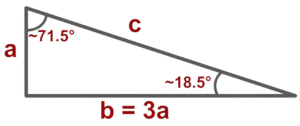
In this right triangle, the base is three times the perpendicular, leading to a unique yet predictable ratio among the sides. It maintains the Pythagorean identity across its configuration.
Use Pythagorean theorem to find base $c$:
$c^2 = a^2 + b^2$
Substitute $a = 3a$:
$c^2 = a^2 + (3a)^2$
$c^2 = a^2 + 9a^2$
$c^2 = 10a^2$
c = a√10
Find angle
$\sin A = \frac{a}{c} = \frac{a}{a\sqrt{10}} = \frac{1}{\sqrt{10}} = \frac{\sqrt{10}}{10}$
∠A $= \sin^{-1}\left(\frac{\sqrt{10}}{10}\right) \approx 18.43^\circ $
∠B $= 90^\circ – A \approx 71.57^\circ$
- Angle Pattern: 18.435°, 71.565°, 90°
- Side Ratio: a : 3a : √10a
- a = perpendicular
- b = 3a (base)
- c = a√10 (hypotenuse)
- Perimeter = a + 3a + a√10 = a(4 + √10)
- Area = (1/2) × a × 3a = (3/2)a²
- Altitude (h) = (a × b) / c = (3a²) / (a√10) = 3a / √10
This triangle illustrates how changing the side ratio affects perimeter, area, and height while keeping the right-angle structure.
| Triangle Type | Right Triangle with b = 3a |
|---|---|
| Shorter Leg (a) | $x$ |
| Longer Leg (b) | $3x$ |
| Hypotenuse (c) | $\sqrt{x^2 + (3x)^2} = \sqrt{10}x$ |
| Angle α | 18.43° |
| Angle β | 71.57° |
| Area | $\frac{1}{2} \times x \times 3x$$ = \frac{3x^2}{2}$ |
| Perimeter | $x + 3x + \sqrt{10}x $$= x(4 + \sqrt{10})$ |
| Height (h) | $h = \frac{ab}{c}$$ = \frac{x \times 3x}{\sqrt{10}x}$$ = \frac{3x}{\sqrt{10}}$ |
5. 3x-4x-5x Right Triangle (Pythagorean Triplet)
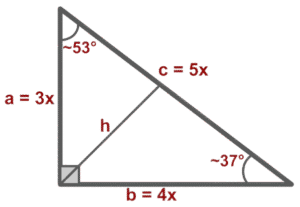
This triangle is a classic example of a right triangle with integer side ratios, commonly known as a Pythagorean Triplet. It scales in multiples of a unit “x”.
Find angle
$\sin A = \frac{\text{opposite}}{\text{hypotenuse}} = \frac{3x}{5x} = \frac{3}{5} = 0.6$
∠A $=\sin^{-1}(0.6) \approx 36.87^\circ$
∠B $=90^\circ – A \approx 53.13^\circ$
- Angle Pattern: 36.87°, 53.13°, 90°
- Side Ratio: 3x : 4x : 5x
- a = 3x (perpendicular)
- b = 4x (base)
- c = 5x (hypotenuse)
- Perimeter = 3x + 4x + 5x = 12x
- Area = (1/2) × 3x × 4x = 6x²
- Altitude (h) = (a × b) / c = (12x²) / (5x) = (12/5)x
This triangle is especially useful in construction, architecture, and exam problems because of its simple, integer-based proportions.
| Triangle Type | Right Triangle with sides 3x – 4x- 5x |
|---|---|
| Shorter Leg (a) | $3x$ |
| Longer Leg (b) | $4x$ |
| Hypotenuse (c) | $5x$ |
| Angle α | 36.87° |
| Angle β | 53.13° |
| Area | $\frac{1}{2} \times 3x \times 4x$$ = 6x^{2}$ |
| Perimeter | $3x + 4x + 5x $$= 12x$ |
| Height (h) | $h = \frac{ab}{c}$$ = \frac{3x \times 4x}{5x}$$ = \frac{12x}{5}$ |
45°-45°-90° Triangle: Question & Answer Problems
Case 1: Given Perpendicular (a), find Base (b), Hypotenuse (c), Perimeter (P), Area (A), Altitude to Hypotenuse (H)
If the perpendicular side of a 45°-45°-90° triangle is 5 units, find all the remaining sides and properties.
Given:
- Perpendicular side a = units
- Triangle type: 45°-45°-90°
Solution:
- Base b = a units
- Hypotenuse c = $5\sqrt{2} \approx 7.071$ units
- Perimeter P = $5 + 5 + 5\sqrt{2} \approx 17.071$ units
- Area A =$\frac{1}{2}(5)^2$ = square units
- Altitude H = $\frac{ab}{c}$ = units
Case 2: Given Base (b), find Perpendicular (a), Hypotenuse (c), Perimeter (P), Area (A), Altitude to Hypotenuse (H)
If the base side of a 45°-45°-90° triangle is 5 units, find all the remaining sides and properties.
Given:
- Base side b = units
- Triangle type: 45°-45°-90°
Solution:
- Perpendicular a = b units
- Hypotenuse c = $5\sqrt{2} \approx 7.071$ units
- Perimeter P = $5 + 5 + 5\sqrt{2} \approx 17.071$ units
- Area A = $\frac{1}{2}(5)^2$ = square units
- Altitude H = $\frac{ab}{c}$ = units
Case 3: Given Hypotenuse (c), find Perpendicular (a), Base (b), Perimeter (P), Area (A), Altitude to Hypotenuse (H)
If the hypotenuse side of a 45°-45°-90° triangle is \(7.071\) units, find all the remaining sides and properties.
Given:
- Hypotenuse side c = units
- Triangle type: 45°-45°-90°
Solution:
- Perpendicular a = \(\frac{c}{\sqrt{2}}\) units
- Base b = a units
- Perimeter P = \(a + b + c = 5 + 5 + 7.071 \approx 17.071\) units
- Area A = \(\frac{1}{2} a b = \frac{1}{2} \times 5 \times 5\) = square units
- Altitude H = \(\frac{a b}{c} = \frac{5 \times 5}{7.071}\) ≈ units
Case 4: Given Perimeter (P), find Perpendicular (a), Base (b), Hypotenuse (c), Area (A), Altitude to Hypotenuse (H)
If the perimeter of a 45°-45°-90° triangle is \(17.071\) units, find all the remaining sides and properties.
Given:
- Perimeter P = units
- Triangle type: 45°-45°-90°
Solution:
- Perpendicular a = \(\frac{P}{2 + \sqrt{2}}\) units
- Base b = a units
- Hypotenuse c = \(a \sqrt{2}\) units
- Area A = \(\frac{1}{2} a b = \frac{1}{2} \times 5 \times 5\) = square units
- Altitude H = \(\frac{a b}{c} = \frac{5 \times 5}{7.071}\) ≈ units
Case 5: Given Area (A), find Perpendicular (a), Base (b), Hypotenuse (c), Perimeter (P), Altitude to Hypotenuse (H)
If the area of a 45°-45°-90° triangle is \(12.5\) square units, find all the remaining sides and properties.
Given:
- Area A = square units
- Triangle type: 45°-45°-90°
Solution:
- Perpendicular a = \(\sqrt{2A}\) units
- Base b = a units
- Hypotenuse c = \(a \sqrt{2}\) units
- Perimeter P = \(a + b + c = 5 + 5 + 7.071 \approx 17.071\) units
- Altitude H = \(\frac{a b}{c} = \frac{5 \times 5}{7.071}\) ≈ units
Case 6: Given Altitude to Hypotenuse (H), find Perpendicular (a), Base (b), Hypotenuse (c), Perimeter (P), Area (A)
If the altitude to hypotenuse of a 45°-45°-90° triangle is \(3.536\) units, find all the remaining sides and properties.
Given:
- Altitude (H) = 3.536 units
- Triangle type: 45°-45°-90°
Solution:
- Perpendicular a = \(H \sqrt{2}\) units
- Base b = a units
- Hypotenuse c = \(a \sqrt{2}\) units
- Perimeter P = \(a + b + c = 5 + 5 + 7.071 \approx 17.071\) units
- Area A = \(\frac{1}{2} a b = \frac{1}{2} \times 5 \times 5\) = square units
30°-60°-90° Triangle: Question & Answer Problems
Case 1: Given Perpendicular (a), find Base (b), Hypotenuse (c), Perimeter (P), Area (A), Altitude to Hypotenuse (H)
If the perpendicular side of a 30°-60°-90° triangle is 5 units, find all the remaining sides and properties.
Given:
- Perpendicular side a = units
- Triangle type: 30°-60°-90°
Solution:
- Base b = a √3
- Hypotenuse c = 2a units
- Perimeter P = a + b + c = $5 + 5\sqrt{3} + 10 \approx 23.660$ units
- Area A = $\frac{1}{2} \times a \times b$ = $\frac{1}{2} \times 5 \times 5\sqrt{3}$ = $\frac{25\sqrt{3}}{2} \approx 21.650$ square units
- Altitude H = $\frac{ab}{c}$ = $\frac{5 \times 5\sqrt{3}}{10}$ = $\frac{25\sqrt{3}}{10}$ = $\frac{5\sqrt{3}}{2} \approx$ 4.330 units
Case 2: Given Base (b), find Perpendicular (a), Hypotenuse (c), Perimeter (P), Area (A), Altitude to Hypotenuse (H)
If the base side of a 30°-60°-90° triangle is 8.660 units, find all the remaining sides and properties.
Given:
- Base side b = units
- Triangle type: 30°-60°-90°
Solution:
- Perpendicular a = $\frac{b}{\sqrt{3}}$ units
- Hypotenuse c = 2a units
- Perimeter P = a + b + c = 5 + 8.660 + $10 \approx 23.660$ units
- Area A = $\frac{1}{2} \times a \times b$ = $\frac{1}{2} \times 5 \times 8.660 = 21.650$ square units
- Altitude H = $\frac{ab}{c}$ = $\frac{5 \times 8.660}{10}$ = $\frac{43.3}{10}$ = 4.330 units
Case 3: Given Hypotenuse (c), find Perpendicular (a), Base (b), Perimeter (P), Area (A), Altitude to Hypotenuse (H)
If the hypotenuse side of a 30°-60°-90° triangle is 10 units, find all the remaining sides and properties.
Given:
- Hypotenuse side c = units
- Triangle type: 30°-60°-90°
Solution:
- Perpendicular a = $\frac{c}{2}$ units
- Base b = $a \sqrt{3}$ units
- Perimeter P = a + b + c = 5 + 8.660 + $10 \approx 23.660$ units
- Area A = $\frac{1}{2} \times a \times b$ = $\frac{1}{2} \times 5 \times 8.660 $= 21.650 square units
- Altitude H = $\frac{ab}{c}$ = $\frac{5 \times 8.660}{10}$ = $\frac{43.3}{10}$ = 4.330 units
Case 4: Given Perimeter (P), find Perpendicular (a), Base (b), Hypotenuse (c), Area (A), Altitude to Hypotenuse (H)
If the perimeter of a 30°-60°-90° triangle is 23.660 units, find all the remaining sides and properties.
Given:
- Perimeter P = units
- Triangle type: 30°-60°-90°
Solution:
- Perpendicular a = $\frac{P}{3 + \sqrt{3}}$ units
- Base b = $a \sqrt{3}$ units
- Hypotenuse c = 2a units
- Area A = $\frac{1}{2} \times a \times b$ = $\frac{1}{2} \times 5 \times 8.660$ = 21.650 square units
- Altitude H = $\frac{ab}{c}$ = $\frac{5 \times 8.660}{10}$ = 4.330 units
Case 5: Given Area (A), find Perpendicular (a), Base (b), Hypotenuse (c), Perimeter (P), Altitude to Hypotenuse (H)
If the area of a 30°-60°-90° triangle is 21.650 square units, find all the remaining sides and properties.
Given:
- Area A = square units
- Triangle type: 30°-60°-90°
Solution:
- Perpendicular a = $\sqrt{\frac{2A}{\sqrt{3}}}$ units
- Base b = $a \sqrt{3}$ units
- Hypotenuse c = 2a units
- Perimeter P = a + b + c = 5 + 8.660 + $10 \approx 23.660$ units
- Altitude H = $\frac{ab}{c}$ = $\frac{5 \times 8.660}{10} = 4.330$ units
Case 6: Given Altitude to Hypotenuse (H), find Perpendicular (a), Base (b), Hypotenuse (c), Perimeter (P), Area (A)
If the altitude to hypotenuse of a 30°-60°-90° triangle is 4.330 units, find all the remaining sides and properties.
Given:
- Altitude to Hypotenuse H = units
- Triangle type: 30°-60°-90°
Solution:
- Perpendicular a = $\frac{2H}{\sqrt{3}}$ units
- Base b = $a \sqrt{3}$ units
- Hypotenuse c = 2 × units
- Perimeter P = a + b + c = 5 + 8.660 + $10 \approx 23.660 $units
- Area A = $\frac{1}{2} \times a \times b$ = $\frac{1}{2} \times 5 \times 8.660$ = 21.650 square units
Right Triangle with b = 2a: Question & Answer Problems
Case 1: Given Perpendicular (a), find Base (b), Hypotenuse (c), Perimeter (P), Area (A), Altitude to Hypotenuse (H)
If the perpendicular side a of a right triangle with base \(b=2a\) is 5 units, find all remaining sides and properties.
- Perpendicular (a) = 5 units
- Base (b) = 2a = 2 × 5 = 10 units
- Hypotenuse (c) = \(\sqrt{5}a = \sqrt{5} \times 5 \approx 11.180\) units
- Perimeter (P) = \(a + b + c = 5 + 10 + 11.180 = 26.180\) units
- Area (A) = \(\frac{1}{2} \times a \times b = \frac{1}{2} \times 5 \times 10 = 25\) square units
- Altitude to Hypotenuse (H) = \(\frac{ab}{c} = \frac{5 \times 10}{11.180} \approx 4.472\) units
Case 2: Given Base (b), find Perpendicular (a), Hypotenuse (c), Perimeter (P), Area (A), Altitude to Hypotenuse (H)
If the base side b of a right triangle with base \(b=2a\) is 10 units, find all remaining sides and properties.
- Base (b) = 10 units
- Perpendicular (a) = \(\frac{b}{2} = \frac{10}{2} = 5\) units
- Hypotenuse (c) = \(\sqrt{5}a = \sqrt{5} \times 5 \approx 11.180\) units
- Perimeter (P) = \(a + b + c = 5 + 10 + 11.180 = 26.180\) units
- Area (A) = \(\frac{1}{2} \times a \times b = \frac{1}{2} \times 5 \times 10 = 25\) square units
- Altitude to Hypotenuse (H) = \(\frac{ab}{c} = \frac{5 \times 10}{11.180} \approx 4.472\) units
Case 3: Given Hypotenuse (c), find Perpendicular (a), Base (b), Perimeter (P), Area (A), Altitude to Hypotenuse (H)
If the hypotenuse c of a right triangle with base \(b=2a\) is 11.180 units, find all remaining sides and properties.
- Hypotenuse (c) = 11.180 units
- Perpendicular (a) = \(\frac{c}{\sqrt{5}} = \frac{11.180}{\sqrt{5}} = 5\) units
- Base (b) = \(2a = 2 \times 5 = 10\) units
- Perimeter (P) = \(a + b + c = 5 + 10 + 11.180 = 26.180\) units
- Area (A) = \(\frac{1}{2} \times a \times b = 25\) square units
- Altitude to Hypotenuse (H) = \(\frac{ab}{c} = \frac{5 \times 10}{11.180} \approx 4.472\) units
Case 4: Given Perimeter (P), find Perpendicular (a), Base (b), Hypotenuse (c), Area (A), Altitude to Hypotenuse (H)
If the perimeter P of a right triangle with base \(b=2a\) is 26.180 units, find all remaining sides and properties.
- Perimeter (P) = 26.180 units
- Perpendicular (a) = \(\frac{P}{3 + \sqrt{5}} = \frac{26.180}{3 + \sqrt{5}} = 5\) units
- Base (b) = \(2a = 10\) units
- Hypotenuse (c) = \(\sqrt{5}a = 11.180\) units
- Area (A) = \(a^2 = 25\) square units
- Altitude to Hypotenuse (H) = \(\frac{2a}{\sqrt{5}} = 4.472\) units
Case 5: Given Area (A), find Perpendicular (a), Base (b), Hypotenuse (c), Perimeter (P), Altitude to Hypotenuse (H)
If the area A of a right triangle with base \(b=2a\) is 25 square units, find all remaining sides and properties.
- Area (A) = 25 square units
- Perpendicular (a) = \(\sqrt{A} = \sqrt{25} = 5\) units
- Base (b) = \(2a = 10\) units
- Hypotenuse (c) = \(\sqrt{5}a = 11.180\) units
- Perimeter (P) = \(a + b + c = 26.180\) units
- Altitude to Hypotenuse (H) = \(\frac{2a}{\sqrt{5}} = 4.472\) units
Case 6: Given Altitude to Hypotenuse (H), find Perpendicular (a), Base (b), Hypotenuse (c), Perimeter (P), Area (A)
If the altitude to hypotenuse H of a right triangle with base \(b=2a\) is 4.472 units, find all remaining sides and properties.
- Altitude to Hypotenuse (H) = 4.472 units
- Perpendicular (a) = \(\frac{H \sqrt{5}}{2} = \frac{4.472 \times \sqrt{5}}{2} = 5\) units
- Base (b) = \(2a = 10\) units
- Hypotenuse (c) = \(\sqrt{5}a = 11.180\) units
- Perimeter (P) = \((3 + \sqrt{5})a = 26.180\) units
- Area (A) = \(a^2 = 25\) square units
Right Triangle with b = 3a: Question & Answer Problems
Case 1: Given Perpendicular (a), find Base (b), Hypotenuse (c), Perimeter (P), Area (A), Altitude to Hypotenuse (H)
If the perpendicular side a of a right triangle with base \(b = 3a\) is 5 units, find all remaining sides and properties.
- Perpendicular (a) = 5 units
- Base (b) = 3a = 3 × 5 = 15 units
- Hypotenuse (c) = \(\sqrt{a^2 + b^2} = \sqrt{5^2 + 15^2} = \sqrt{250} \approx 15.811\) units
- Perimeter (P) = a + b + c = 5 + 15 + 15.811 = 35.811 units
- Area (A) = \(\frac{1}{2}ab = \frac{1}{2} × 5 × 15 = 37.5\) square units
- Altitude to Hypotenuse (H) = \(\frac{ab}{c} = \frac{5 × 15}{15.811} \approx 4.748\) units
Case 2: Given Base (b), find Perpendicular (a), Hypotenuse (c), Perimeter (P), Area (A), Altitude to Hypotenuse (H)
If the base side b of a right triangle with \(b = 3a\) is 15 units, find all remaining sides and properties.
- Base (b) = 15 units
- Perpendicular (a) = b / 3 = 15 / 3 = 5 units
- Hypotenuse (c) = \(\sqrt{5^2 + 15^2} = \sqrt{250} \approx 15.811\) units
- Perimeter (P) = 5 + 15 + 15.811 = 35.811 units
- Area (A) = \(\frac{1}{2} × 5 × 15 = 37.5\) square units
- Altitude to Hypotenuse (H) = \(\frac{ab}{c} = \frac{75}{15.811} \approx 4.748\) units
Case 3: Given Hypotenuse (c), find Perpendicular (a), Base (b), Perimeter (P), Area (A), Altitude to Hypotenuse (H)
If the hypotenuse c of a right triangle with \(b = 3a\) is 15.811 units, find all remaining sides and properties.
- Hypotenuse (c) = 15.811 units
- Using identity: \(c = a\sqrt{1^2 + 3^2} = a\sqrt{10}\) → \(a = \frac{c}{\sqrt{10}} = \frac{15.811}{\sqrt{10}} \approx 5\)
- Perpendicular (a) = 5 units
- Base (b) = 3a = 15 units
- Perimeter (P) = 5 + 15 + 15.811 = 35.811 units
- Area (A) = 37.5 square units
- Altitude to Hypotenuse (H) = \(\frac{ab}{c} = \frac{75}{15.811} \approx 4.748\) units
Case 4: Given Perimeter (P), find Perpendicular (a), Base (b), Hypotenuse (c), Area (A), Altitude to Hypotenuse (H)
If the perimeter P of a right triangle with \(b = 3a\) is 35.811 units, find all sides and properties.
- Perimeter (P) = a + b + c = a + 3a + \(\sqrt{10}a\) = \(a(4 + \sqrt{10})\)
- ⇒ a = P / (4 + √10) ≈ 35.811 / 7.1623 ≈ 5 units
- Perpendicular (a) = 5 units
- Base (b) = 15 units
- Hypotenuse (c) = 15.811 units
- Area (A) = 37.5 square units
- Altitude to Hypotenuse (H) = 4.748 units
Case 5: Given Area (A), find Perpendicular (a), Base (b), Hypotenuse (c), Perimeter (P), Altitude to Hypotenuse (H)
If the area A of a right triangle with \(b = 3a\) is 37.5 square units, find all sides and properties.
- Area (A) = \(\frac{1}{2}ab = \frac{1}{2} × a × 3a = \frac{3a^2}{2}\)
- ⇒ a = √(2A / 3) = √(75 / 3) = √25 = 5 units
- Perpendicular (a) = 5 units
- Base (b) = 15 units
- Hypotenuse (c) = 15.811 units
- Perimeter (P) = 35.811 units
- Altitude to Hypotenuse (H) = 4.748 units
Case 6: Given Altitude to Hypotenuse (H), find Perpendicular (a), Base (b), Hypotenuse (c), Perimeter (P), Area (A)
If the altitude to hypotenuse H of a right triangle with \(b = 3a\) is approximately 4.748 units, find all sides and properties.
- Use: \(H = \frac{ab}{c}\) and \(b = 3a\), \(c = \sqrt{10}a\)
- ⇒ H = \(\frac{3a^2}{\sqrt{10}a} = \frac{3a}{\sqrt{10}}\)
- ⇒ a = H × \(\sqrt{10}/3\) = 4.748 × \(\sqrt{10}/3\) ≈ 5 units
- Perpendicular (a) = 5 units
- Base (b) = 15 units
- Hypotenuse (c) = 15.811 units
- Perimeter (P) = 35.811 units
- Area (A) = 37.5 square units
3x-4x-5x Right Triangle: Question & Answer Problems
Case 1: Given Perpendicular (a), find Base (b), Hypotenuse (c), Perimeter (P), Area (A), Altitude to Hypotenuse (H)
If the perpendicular side a of a 3x–4x–5x right triangle is 6 units, find all remaining sides and properties.
- Perpendicular (a) = 6 units
- Base (b) = \(\frac{4}{3}a = \frac{4}{3} \times 6 = 8\) units
- Hypotenuse (c) = \(\frac{5}{3}a = \frac{5}{3} \times 6 = 10\) units
- Perimeter (P) = \(a + b + c = 6 + 8 + 10 = 24\) units
- Area (A) = \(\frac{1}{2} \times a \times b = \frac{1}{2} \times 6 \times 8 = 24\) square units
- Altitude to Hypotenuse (H) = \(\frac{ab}{c} = \frac{6 \times 8}{10} = 4.8\) units
Case 2: Given Base (b), find Perpendicular (a), Hypotenuse (c), Perimeter (P), Area (A), Altitude to Hypotenuse (H)
If the base b of a 3x–4x–5x triangle is 8 units, find all remaining sides and properties.
- Base (b) = 8 units
- Perpendicular (a) = \(\frac{3}{4}b = \frac{3}{4} \times 8 = 6\) units
- Hypotenuse (c) = \(\frac{5}{4}b = \frac{5}{4} \times 8 = 10\) units
- Perimeter (P) = \(a + b + c = 6 + 8 + 10 = 24\) units
- Area (A) = \(\frac{1}{2} \times a \times b = \frac{1}{2} \times 6 \times 8 = 24\) square units
- Altitude to Hypotenuse (H) = \(\frac{ab}{c} = \frac{6 \times 8}{10} = 4.8\) units
Case 3: Given Hypotenuse (c), find Perpendicular (a), Base (b), Perimeter (P), Area (A), Altitude to Hypotenuse (H)
If the hypotenuse c of a 3x–4x–5x triangle is 10 units, find all remaining sides and properties.
- Hypotenuse (c) = 10 units
- Perpendicular (a) = \(\frac{3}{5}c = \frac{3}{5} \times 10 = 6\) units
- Base (b) = \(\frac{4}{5}c = \frac{4}{5} \times 10 = 8\) units
- Perimeter (P) = \(a + b + c = 6 + 8 + 10 = 24\) units
- Area (A) = \(\frac{1}{2} \times a \times b = \frac{1}{2} \times 6 \times 8 = 24\) square units
- Altitude to Hypotenuse (H) = \(\frac{ab}{c} = \frac{6 \times 8}{10} = 4.8\) units
Case 4: Given Perimeter (P), find Perpendicular (a), Base (b), Hypotenuse (c), Area (A), Altitude to Hypotenuse (H)
If the perimeter P of a 3x–4x–5x triangle is 24 units, find all remaining sides and properties.
- Perimeter (P) = 24 units
- Scale (x) = \( \frac{P}{3+4+5} = \frac{24}{12} = 2 \)
- Perpendicular (a) = \(3x = 3 \times 2 = 6\) units
- Base (b) = \(4x = 4 \times 2 = 8\) units
- Hypotenuse (c) = \(5x = 5 \times 2 = 10\) units
- Area (A) = \(\frac{1}{2} \times a \times b = \frac{1}{2} \times 6 \times 8 = 24\) square units
- Altitude to Hypotenuse (H) = \(\frac{ab}{c} = \frac{6 \times 8}{10} = 4.8\) units
Case 5: Given Area (A), find Perpendicular (a), Base (b), Hypotenuse (c), Perimeter (P), Altitude to Hypotenuse (H)
If the area A of a 3x–4x–5x triangle is 24 square units, find all remaining sides and properties.
- Area (A) = 24 square units
- Let scale x: \(\frac{1}{2} \times 3x \times 4x\) = \(24 \Rightarrow 6x^2 = 24 \Rightarrow x^2\) = \(4 \Rightarrow x = 2\)
- Perpendicular (a) = \(3x = 6\) units
- Base (b) = \(4x = 8\) units
- Hypotenuse (c) = \(5x = 10\) units
- Perimeter (P) = \(6 + 8 + 10 = 24\) units
- Altitude to Hypotenuse (H) = \(\frac{ab}{c} = \frac{6 \times 8}{10} = 4.8\) units
Case 6: Given Altitude to Hypotenuse (H), find Perpendicular (a), Base (b), Hypotenuse (c), Perimeter (P), Area (A)
If the altitude to the hypotenuse H of a 3x–4x–5x triangle is 4.8 units, find all remaining sides and properties.
- Altitude to Hypotenuse (H) = 4.8 units
- Let x = scale. Then:
\(a = 3x, b = 4x, c = 5x\)
\(H = \frac{ab}{c} = \frac{3x \times 4x}{5x} = \frac{12x^2}{5x} = \frac{12x}{5}\)
\(\frac{12x}{5} = 4.8 \Rightarrow x = 2\) - Perpendicular (a) = \(3x = 6\) units
- Base (b) = \(4x = 8\) units
- Hypotenuse (c) = \(5x = 10\) units
- Perimeter (P) = \(6 + 8 + 10 = 24\) units
- Area (A) = \(\frac{1}{2} \times a \times b = \frac{1}{2} \times 6 \times 8 = 24\) square units
Frequently Asked Questions on Special Right Triangles Calculator
1. What is a 45°-45°-90° triangle?
A 45°-45°-90° triangle is an isosceles right triangle where both legs are equal, and the hypotenuse is x√2. It’s commonly used in geometry due to its symmetry.
2. What are the side ratios in a 45°-45°-90° triangle?
The side lengths follow the ratio:
Leg : Leg : Hypotenuse =$x : x : x\sqrt{2}$
3. What is a 30°-60°-90° triangle?
A 30°-60°-90° triangle is a special right triangle with angle measures 30°, 60°, and 90°. Its sides follow a unique ratio useful in trigonometry and geometry.
4. What are the side ratios in a 30°-60°-90° triangle?
The side lengths follow the ratio:
Short leg : Long leg : Hypotenuse = $x :x\sqrt{3}: 2x$ . The shorter leg is opposite the 30°, the longer leg is opposite the 60°, and the hypotenuse is opposite the 90° angle.
5. What is a right triangle with b = 2a?
It is a right triangle where the longer leg 𝑏 is twice the length of the shorter leg 𝑎. The hypotenuse is computed using the Pythagorean theorem: c = $\sqrt{a^2+(2a)^2 }$ = a√5
5. What is a right triangle with b=3a?
It is a right triangle where the longer leg 𝑏 is twice the length of the shorter leg 𝑎. The hypotenuse is computed using the Pythagorean theorem: c = $\sqrt{a^2+b^2 }$= $\sqrt{a^2+(3a)^2 }$ = a√10
6. How do you calculate height h in these triangles?
The height from the right angle to the hypotenuse is calculated using: h= ab/c.
7. What are the angles in a triangle where b = 3a?
The angle opposite the shorter leg is:
$\alpha = \tan^{-1}\left(\frac{1}{3}\right) \approx 18.43^\circ$
The other angle is:
$\beta = 90^\circ – \alpha \approx 71.57^\circ$
8. What are the angles in a triangle where b = 2a?
The angle opposite the shorter leg is:
$\alpha = \tan^{-1}\left(\frac{1}{2}\right) \approx 26.57^\circ$
The other angle is:
$\beta = 90^\circ – \alpha \approx 63.43^\circ$
Final Thought:
Whether you’re a student, teacher, or enthusiast, the Special Right Triangles Calculator is your reliable tool for mastering right triangle problems. With support for five key types — 45°-45°-90°, 30°-60°-90°, b = 2a, b = 3a, and 3x-4x-5x triangles — this calculator ensures fast, accurate, and insightful results. It takes the complexity out of calculations and helps you understand the unique patterns behind each special triangle type.
My Request to All: If you enjoy using my Special Right Triangles Calculator and my website, please consider sharing the link to this page or the website with your friends. Additionally, if you have any requests, complaints, suggestions, or feedback, feel free to reach out via our WhatsApp channel or Telegram group.
Telegram Link – Join Our Telegram Channel
YouTube Link – Subscribe to Our YouTube Channel
For more tools, please visit our homepage at CalculationClub – Free Online Calculators
For additional tools in Hindi, you can visit MeterToFeet
Thank you for your support!
